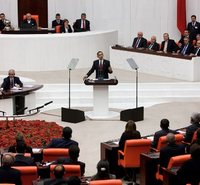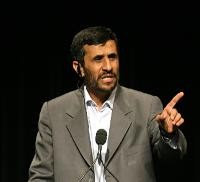Despite some typically incendiary remarks, Iranian President Mahmoud Ahmadinejad’s attendance at the U.N. General Assembly’s 65th session in New York was marked by a low-key tone noted by many. The change in tone, including a reported willingness to resume talks with the U.S. and its allies, reflects the impact of Iran’s domestic politics. For increasingly, Ahmadinejad’s real battle is at home, against the mullahs who brought him to power. And in that struggle, Ahmadinejad and his allies are increasingly embracing Iran’s venerable 2,500-year-old national heritage to attack its recent three-decade Islamist experiment. The latest salvo, via a Web site called […]
Iran Archive
Free Newsletter
When Bob Woodward’s book, “Obama’s Wars,” is released on Monday, the denizens of Washington’s Beltway will eagerly skip to the index to see whether they are mentioned — and if not, who is. But as they digest the stories of infighting, rivalry and catty comments among the president’s national security team, excerpts of which have already begun to circulate, the larger question is whether the revelations in the latest Woodward tome will have an impact on the Obama administration’s Afghan policy. Woodward seems to confirm what many have suspected ever since President Barack Obama’s speech at West Point announcing the […]

Years ago, when world leaders started speaking out about the dangers of Iran’s nuclear program, one of the potential threats they cited was the possibility that it would spark a flurry of competing nuclear programs throughout the Middle East. Today, as international efforts to stop Iran’s uranium enrichment remain unsuccessful, the once-distant prospect of a Middle East crowded with nuclear plants has moved a long way toward becoming a reality. In recent days, Jordan signed a nuclear cooperation deal with Japan, setting the stage for the Hashemite kingdom to start receiving nuclear technology and nuclear materials. Japanese officials also inked […]
With international attention overwhelmingly focused on Iran’s nuclear program and its ultimate objectives, the country’s conventional weapons capability often goes unexamined. In an e-mail interview, Anoush Ehteshami, professor of international relations at Durham University’s School of Government and International Affairs, discusses Iran’s conventional weapons capability. WPR: What conventional weapons capability does Iran currently have, and how much does it devote to defense spending? Anoush Ehteshami: Iran’s conventional weapons capability has gone through a revolution since 1979 and the subsequent severance of ties with the U.S. and other Western militaries. The eight-year-long Iran-Iraq war had the most direct impact, in terms […]

If America could be magically granted its ideal Muslim strategic partner, what would we ask for? Would we want a country that fell in line with every U.S. foreign policy stance? Not if the regime was to have any credibility with the Islamic world. No, ideally, the government would be just Islamist enough to be seen as preserving the nation’s religious and cultural identity, even as it aggressively modernized its society and connected its economy to the larger world. It would have an activist foreign policy that emphasized diplomacy, multilateralism and regional stability, while also maintaining sufficient independence from America […]

In early August, at the fourth trilateral summit between Iran, Afghanistan and Tajikistan held in Tehran, Iranian President Mahmoud Ahmadinejad urged the leaders of the other two countries to join in an alliance to counterbalance NATO’s growing presence in Central Asia. Though any such formal alliance is unlikely, the declaration reflects Tehran’s desire to play a larger role in Central Asia’s regional dynamics. If Iran has always been geographically part of the regional context of Central Asia and the Caucasus, Tehran’s geopolitical orientation has historically been focused southward, on the Persian Gulf. For more than a century, Iranian interests in […]
I just got a chance to go through the just-leaked IAEA report on Iran’s nuclear program now, but one thing I’d already noticed is that despite the write-ups of the findings being characteristically damning, no one really paid any attention. Either everyone has been too busy to take a close look, which is possible, since I certainly was. Or else there’s a “violation fatigue” that has set in, whereby the consensus understanding is shifting toward accepting that Iran simply won’t stop its enrichment efforts, whether in LEU or 20 percent enriched uranium. If that’s true, it will probably take something […]
There’s an easy punchline in the fact that despite its “zero problems with neighbors” policy increasingly bearing fruit, Turkey’s defense spending continues to climb. But the truth is, if the U.S. is able to live with the instability that could result from “turning the page” on Iraq, that’s because it will remain distant. Turkey and Iraq’s other neighbors, however, once again have a very unpredictable near- and medium-term forecast on their borders. Add to that the inherent volatility of the current standoff over Iran’s nuclear program and the nature of the Middle East, and the fact that Turkey is hedging […]
